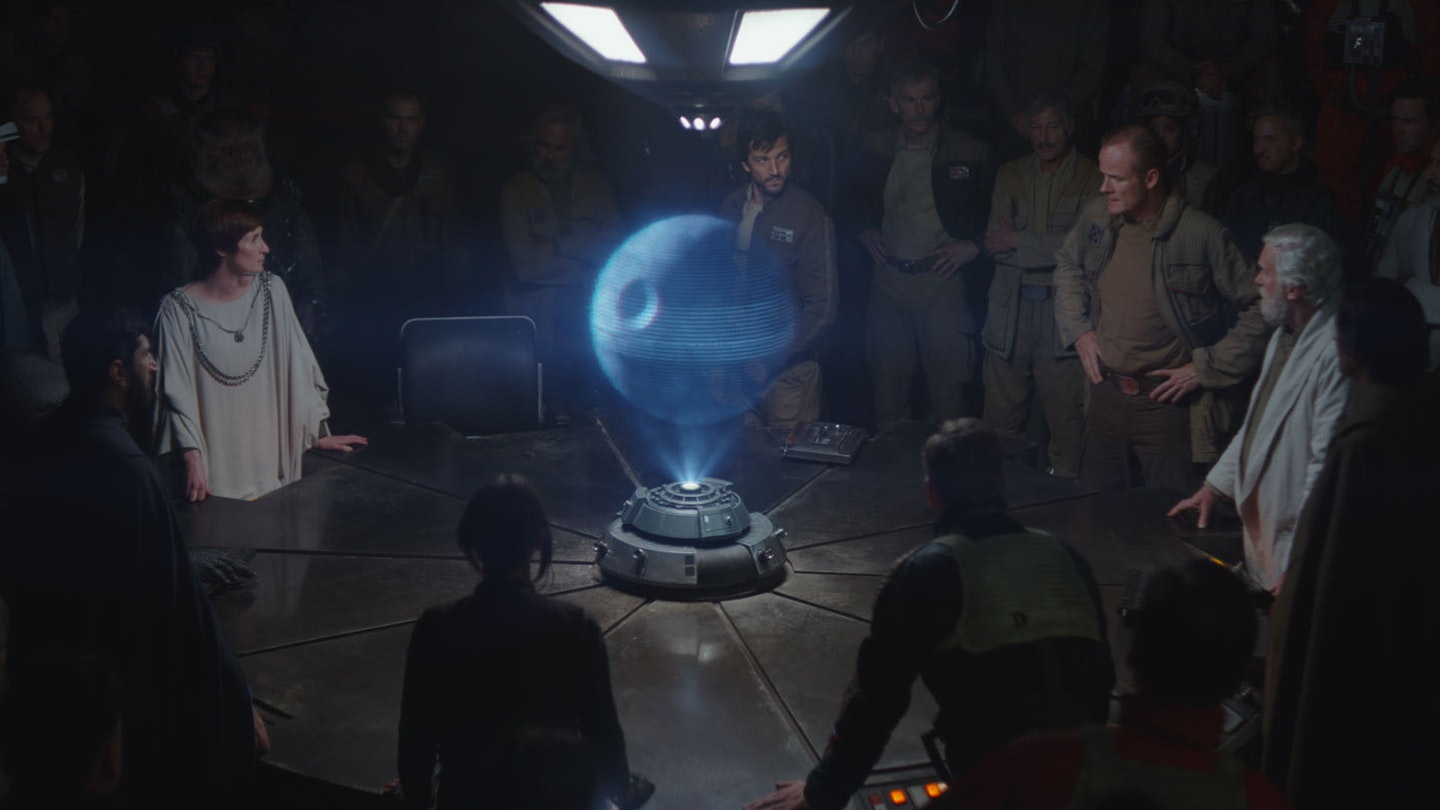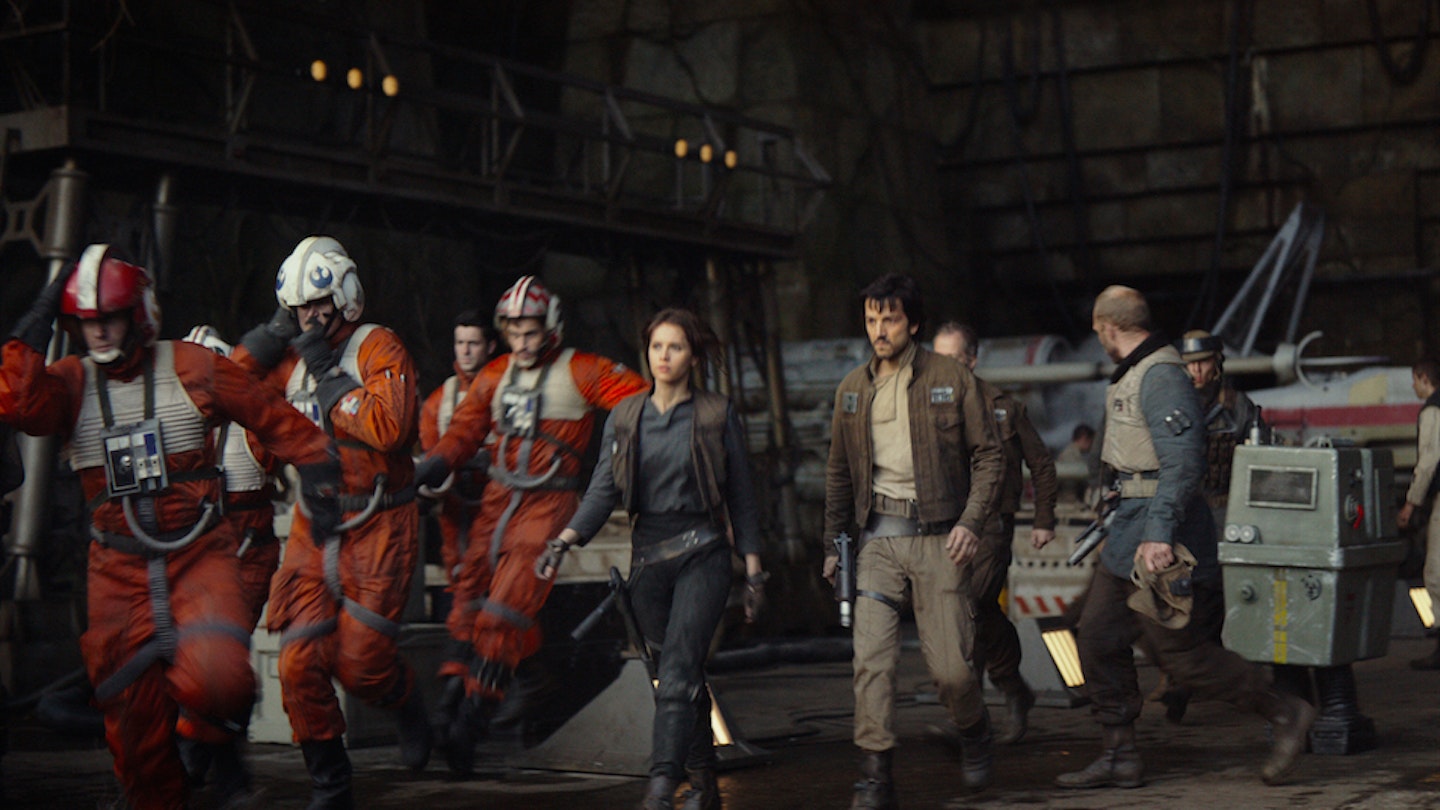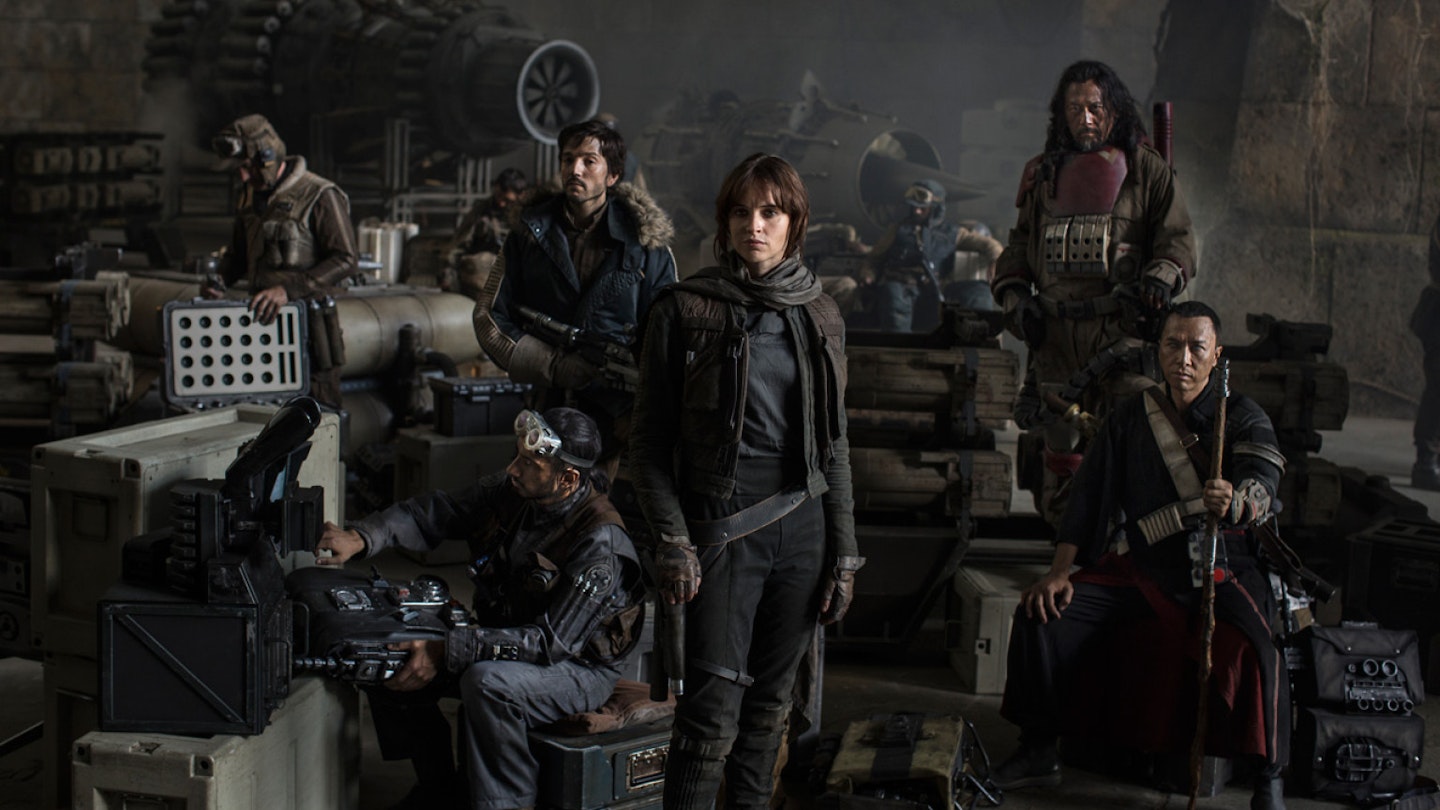Rebel Spies

Kennedy: We had a blast going all over the world meeting actors, looking at potential talent and really thinking about this as an ensemble. This is a story where you are going to see the Rebel Alliance become the Rebel Alliance, so in that idea there are these disparate groups all around the galaxy that come together. We just felt right away that that should feel like it is representative of the world and these characters should feel like they represent the audience completely.
Edwards: It was definitely a deliberate thing to have diverse characters. Because Star Wars is so diverse – they have walking carpets and droids. It's about as diverse as it gets. But what happened is things evolved. Like, you know, you've got Star Wars and you've got to make a film [set just] before it. So what do you do? One of the things you can do is look at the things that inspired George and go back to them and see if you can branch off in a different direction. One of the main things that inspired him was Kurosawa's The Hidden Fortress. And there were two characters in particular that inspired C-3PO and R2D2, and they were these Japanese slave-servants who bickered all the time. And I was thinking, "why don't we just do that but without making them robots?" So that started off being Baze and Chirrut.
Donnie Yen (Chirrut Imwe): That's pretty interesting. He did make some referrals [to The Hidden Fortress], but I want to be as original as possible, so I didn't want to just imitate that. But the whole Star Wars universe is based on a lot of Asian and Oriental philosophy and culture, so as a Chinese actor I grew up with this.
Edwards: It feels right that there'd be Asian characters in Star Wars, because it's got such Asian influences. And because it's Star Wars, you can kind of go for anyone: "Who are the best Asian actors in the world?" Though, what's funny is, Jiang Wen, who plays Baze, has never seen Star Wars in his life.
Jiang Wen (Baze Malbus): I know nothing about them. Because when I grew up, there were no American movies in China. That was Cold War time, so no Star Wars. Now there's no Cold War, we can have Star Wars. So I will see it after I finish this movie, from beginning to end.
Edwards: I was like, "Please, please, I wanna get to the premiere of this film and you've never even watched it ever. I think it'll be funny.” because Baze hasn't ever seen Star Wars, so that's totally acceptable.
Riz Ahmed (Bodhi Rook): I was initially called up by Gareth. I just really wanted to work with him, and obviously just be part of this story-world. It was something we've all grown up watching, and quite frankly I would have been really happy just to be on set helping to make tea!
Edwards: Bodhi started out a little bit like Dustin Hoffman's character in Papillion. That's why he's got the goggles on his head. And a little bit Dennis Hopper in Apocalypse Now — you know the guy who accidentally ended up somewhere really bad...
Frankly I would have been really happy just to be on set helping to make tea.
Ahmed: He evolved quite a lot through the pre-production stage and also even through the shoot and then the reshoots. There was a lot of talking and developing things and revisiting things. Ultimately the Bodhi we've arrived at is an everyman who finds himself thrust into the middle of historic events, in a troupe of tough guys and girl, so he's someone who is rightly frazzled and disconcerted by what they're gonna be up against.
Edwards: To be honest, Bodhi just grew and grew in the film because Riz was so good. It was like, "I wanna see Bodhi more and more," so we just kept adding and adding him. I'm probably a closer to Bodhi [than any other character], in that he's "this is all crazy, and what am I doing here?" Though when you watch the film you'll probably want to be more like Cassian.
Diego Luna (Cassian Andor): Star Wars was huge in Mexico. I am the youngest in my family of all the cousins, so when I was very young they were all fans of Star Wars and I just wanted to belong badly, you know? So I started young. But I was attracted to playing Cassian because of his willingness to get his hands dirty and going as far as he needed in order to bring change and freedom. That is the hero you want to portray. That’s the hero we all can be.
Felicity Jones (Jyn Erso): I’d seen Diego in Y Tu Mama Tambien, which I had been a big fan of when I was growing up. I just thought it was the coolest film ever. It was excellent working with him. He and Jyn in the story have a very lovely dynamic, and he’s very open, very collaborative and easygoing, and loves drinking espressos in true Spanish style…
Kennedy: The minute we mentioned to Felicity that we were thinking of casting Diego she just lit up. [Their characters’ relationship] is very contentious at the beginning, but they really grow to need each other in order to accomplish what they are trying to accomplish, and that comes through an evolution of respect, of skill and a certain amount of attraction.
Edwards: With Felicity, I was just trying to find someone who had the right package of likeability and soulfulness and naturalism. Like, even if they’re not improvising, some of their work feels like they improvised. Jyn wasn’t supposed to have this life. It gets fractured and she gets sent on this path where she becomes a fighter to survive. And I wanted you to worry that she might not make it. Like, you can see the crack in the armour. And Felicity has this vulnerability. I hope when you see it, you can tell she’s struggling, that there’s an internal struggle going on. I felt that’s more real and interesting, because as an audience you don’t know if the characters are all gonna make it.

Kennedy: That was something right from the moment when John pitched his story: he had a female lead. Even before we were sitting down and talking about Rey in Episode VII, we were talking about Jyn in Rogue One.
Jones: Jyn is incredibly resourceful and she thinks on her feet. I remember when my agent first phoned me up and said, “there's this role, and she's this pretty incredible female heroine,” I just thought, “okay that doesn't happen very often,” so to get that kind of call is very exciting. And then meeting Gareth, we really clicked and we both had very similar ideas about the way we like to approach filmmaking. You have to feel that excitement to want to play the role and I definitely felt that with Jyn.
Luna: Felicity was the perfect companion for an experience like this. The size of this film is very new for me and I had the perfect friend and confidante to talk about all the fears and things that you have to go through and overcome, you know? Also, with Alan Tudyk it's difficult not to have a great time. It's just impossible.
Star Wars droids become as big stars as their human counterparts.
Kennedy: Alan is stepping into a new droid role [as K-2SO] and he has to find what that droid’s personality is. And he has some stiff competition: Threepio, R2-D2, now BB-8. Star Wars droids become as big stars as their human counterparts. Finding what is specific and new was a big challenge for him. Choosing Alan, he is just an actor who, in his past work, has that ability to have that dry, straight delivery that is always very funny. He's often full of irony. In this case, we have a wonderful character because he is kind of uncensored. He is a reprogrammed Imperial Droid and says whatever is on his mind.
Alan Tudyk (K-2SO): I played a robot in I, Robot, but Kaytoo is very different. He’s, ah… [laughs]. He’s honest. He’s his own man in a way. Though he’s not a man. You know, there’s that little clip that people have seen where Jyn hands him a bag and he just drops it because he’s not gonna be her handmaiden, carrying her things. He definitely has his own opinions and he’s comfortable ignoring what others want him to do.
Edwards: K-2SO is like taking C-3PO and Chewbacca and putting them together. In the original document that John Knoll did, he was described as a black protocol droid and he evolved from that. Now he’s a droid who doesn’t really give a shit about anything other than his friend [Cassian].
Kennedy: With Saw Gerrera, we just became very intrigued with him as a character [from The Clone Wars] and how he fits inside this story.
Forest Whitaker (Saw Gerrera): He's a battered war veteran who has fashioned himself as a freedom fighter. But because they need to make sure that they need to win this battle, he starts to take more extreme points of view. So a lot of the other rebel fighters won't associate with him, and consider Saw as an extremist in the fight against the Empire. All that back story he has — he trained with Anakin Skywalker, Obi-wan Kenobi and Padawan Tano, you know — really blends in beautifully with where we meet him [in Rogue One]. Which is more of a war-torn veteran, suffering and injured from battles and wars.
Kennedy: To be honest, we originally thought we were going to develop Saw into something much larger, but we couldn’t accommodate it. So he is not in the movie as much as we would like to have him in the movie, which creates the opportunity to explore his character even further in our future development.
Whitaker: I’m curious about what else they’re about to do. Because they seem to really like the character, which is great!
